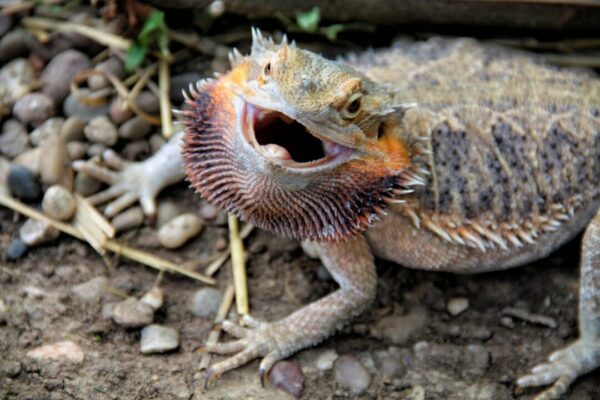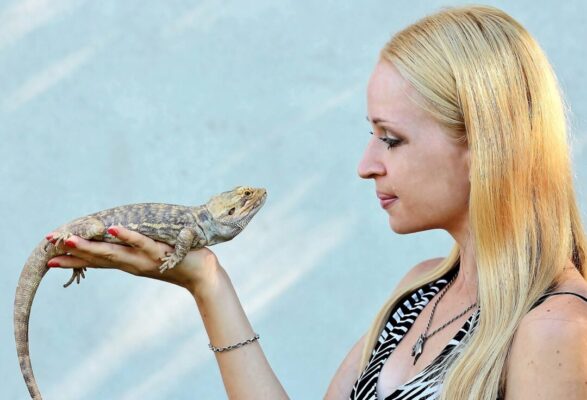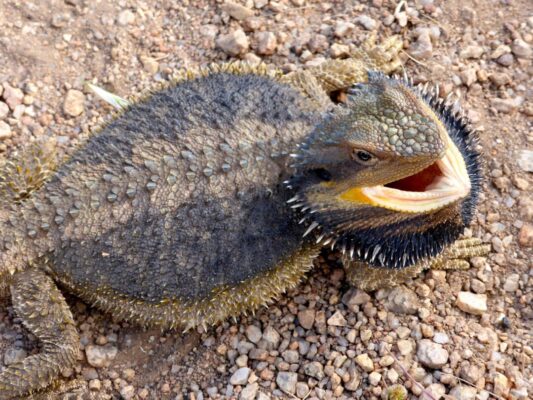Bearded dragons, also known as Pogona, are popular reptile pets known for their unique appearance and docile nature. However, potential owners often wonder, “Do bearded dragons bite?”
In this comprehensive article, we will explore the biting behavior of bearded dragons and provide expert insights and advice on how to prevent and handle bites.
Whether you’re a seasoned bearded dragon owner or considering getting one as a pet, this article will provide all the information you need about bearded dragon bites.
Do Bearded Dragons Bite?

Yes, bearded dragons are capable of biting, although it is not their typical behavior. Biting is usually a last resort for bearded dragons when they are trying to defend themselves. They have a mouthful of small, sharp teeth that can cause minor puncture wounds or scratches if they bite. However, their bites are not usually severe or dangerous to humans.
Why is My Bearded Dragon Trying to Bite Me?

Bearded dragons are popular pet lizards known for their docile demeanor and affectionate personalities. However, they may occasionally exhibit aggressive behavior and attempt to bite their owners or handlers.
Here are five possible reasons why a bearded dragon may try to bite you:
Hunger
Bearded dragons are opportunistic feeders who may mistake your fingers or hand for food if hungry. It is especially true if you offer food by hand or your bearded dragon associates your presence with feeding time. To avoid this, make sure to feed your bearded dragon an appropriate diet regularly and avoid feeding it by hand.
Feeling Threatened
Bearded dragons may feel threatened by unfamiliar people or animals, sudden movements, or environmental changes. If your bearded dragon feels threatened, it may try to defend itself by biting. It is a natural instinct that helps bearded dragons survive in the wild, but it can be dangerous for humans.
To avoid provoking your bearded dragon, make sure to approach it slowly and calmly, avoid sudden movements, and minimize changes to its environment.
Improper Handling
Bearded dragons require gentle handling and may become stressed or agitated if handled too roughly. If your bearded dragon is uncomfortable or stressed, it may try to bite to protect itself. It can happen if you pick it up too quickly, hold it improperly, or don’t support its body properly.
To avoid this, make sure to handle your bearded dragon carefully and with support, and avoid holding it for too long.
Not Socialized
Bearded dragons that are not socialized to humans may view them as threats and react defensively. It can happen if your bearded dragon is not handled regularly as a hatchling or has not had much exposure to human interaction.
To help your bearded dragon become accustomed to human interaction, spend time with it regularly and provide opportunities to explore and interact with you in a safe and controlled environment.
Overexcited
Bearded dragons can become overexcited during play or when they are feeling particularly active.If your bearded dragon is overly excited, it may become nippy or attempt to bite.This behavior can also occur if your bearded dragon is experiencing hormonal changes or is in the breeding season.
To avoid this, make sure to monitor your bearded dragon’s behavior and provide it with appropriate outlets for exercise and play. If your bearded dragon becomes over-excited during play, take a break and let it calm down before resuming.
Do Bearded Dragons Bite Hurt?
Bearded dragons have teeth, but their bites are not typically very painful or dangerous to humans.However, if a bearded dragon bites you hard enough, it could break the skin and cause discomfort or minor injury. It’s important to handle bearded dragons gently and carefully to avoid triggering a bite response.
Bearded Dragons Bite Force
The bite force of a bearded dragon is not particularly strong compared to other animals. While the exact bite force can vary depending on the size and strength of the individual dragon, it is generally estimated to be in the range of 30-40 pounds per square inch (psi). To put that into perspective, a human’s bite force is typically around 160-200 psi.
So while a bearded dragon’s bite can be uncomfortable or startling, it is not likely to cause serious injury.
Are Bearded Dragons Venomous?
No, Bearded Dragons are not venomous. They are a type of lizard native to Australia that is commonly kept as pets due to their docile nature and ease of care. Bearded Dragons are not known to produce any venom or toxic substances that can harm humans or other animals.
What Happens If a Bearded Dragon Bites You?

A bearded dragon bite can be painful and cause bleeding, but they are not venomous, and its bites do not pose a serious health threat to humans. It is important to thoroughly clean the wound and monitor it for signs of infection.
In some cases, if the bite is particularly deep or becomes infected, medical attention may be necessary. It is also important to understand why the bearded dragon may have bitten and take steps to prevent future incidents.
My Bearded Dragon Bite Me and Drew Blood
If your bearded dragon has bitten you and drawn blood, it is important to take immediate steps to clean and disinfect the wound. Wash the affected area with soap and warm water and apply an antiseptic ointment. Monitor the wound closely for any signs of infection, such as redness, swelling, or discharge, and seek medical attention if necessary.
Can a Bearded Dragon Bite Off a Finger?
It is highly unlikely for a bearded dragon to bite off a finger. While they have sharp teeth, they are not strong enough to sever a human finger.
However, a bearded dragon bite can cause injuries such as puncture wounds, so it is important to handle them carefully and with respect.
How To Avoid Bites

Avoiding bites from a bearded dragon requires taking several precautions to reduce the likelihood of aggressive behavior.
Here are some tips to help you avoid bites:
![]() Approach your bearded dragon slowly and calmly: Bearded dragons can become easily agitated if you move too quickly or suddenly. Approach your bearded dragon slowly and calmly, and try to avoid startling it.
Approach your bearded dragon slowly and calmly: Bearded dragons can become easily agitated if you move too quickly or suddenly. Approach your bearded dragon slowly and calmly, and try to avoid startling it.
![]() Handle your bearded dragon gently and carefully: When handling it, make sure to support its body and avoid squeezing it too tightly.
Handle your bearded dragon gently and carefully: When handling it, make sure to support its body and avoid squeezing it too tightly.
Be gentle and avoid sudden movements.
![]() Recognize signs of stress or aggression: Bearded dragons may exhibit signs of stress or aggression before biting, such as hissing, puffing up their bodies, or displaying their beards.
Recognize signs of stress or aggression: Bearded dragons may exhibit signs of stress or aggression before biting, such as hissing, puffing up their bodies, or displaying their beards.
Stop handling your bearded dragon and give it space if you notice these signs.
![]() Socialize your bearded dragon: Socializing your bearded dragon with human interaction can help reduce the likelihood of aggressive behavior.
Socialize your bearded dragon: Socializing your bearded dragon with human interaction can help reduce the likelihood of aggressive behavior.
Spend time with your bearded dragon regularly, offer treats, and interact with it in a safe and controlled environment.
![]() Avoid picking up your bearded dragon from above: Bearded dragons may view picking them up from above as a threat, and it can trigger aggressive behavior.
Avoid picking up your bearded dragon from above: Bearded dragons may view picking them up from above as a threat, and it can trigger aggressive behavior.
Instead, try to approach your bearded dragon from the side and gently scoop it up.
![]() Wash your hands before handling: Make sure to wash your hands before handling your bearded dragon to avoid transferring any scents that may be confusing or unpleasant for your pet.
Wash your hands before handling: Make sure to wash your hands before handling your bearded dragon to avoid transferring any scents that may be confusing or unpleasant for your pet.
![]() Don’t provoke your bearded dragon: Avoid poking or prodding your bearded dragon or doing anything that might be seen as a threat.
Don’t provoke your bearded dragon: Avoid poking or prodding your bearded dragon or doing anything that might be seen as a threat.
Remember that bearded dragons are living creatures with their personalities and preferences and may not always be in the mood for handling or interaction.
Frequently Asked Questions (FAQs)
Can bearded dragon bites cause infections?
Yes, bearded dragon bites can introduce bacteria into the wound, potentially leading to an infection. Proper wound care, including cleaning the bite area thoroughly and applying an antiseptic, can help minimize the risk of infection.
Is bearded dragon bites venomous?
No, bearded dragons are not venomous. Their bites do not contain venom or toxins.
Do bearded dragons bite when they are scared?
Yes, bearded dragons may bite when they feel scared or threatened. Providing your beardie with a calm and secure environment is essential to minimize fear-based biting.
How do I train my bearded dragon not to bite?
Training a bearded dragon not to bite involves consistent handling, positive reinforcement, and gradual socialization. Consult reptile experts or reptile behavior specialists for specific training techniques and guidance.
Can bearded dragons recognize their owners?
While bearded dragons may not have the same level of social recognition as mammals, they can become familiar with their owners through regular handling and positive interactions. They may show signs of recognizing their owners by being more relaxed and receptive to handling.
Are there other reptiles more prone to biting than bearded dragons?
Some reptile species, such as certain types of snakes or monitors, may have a higher tendency to bite compared to bearded dragons. It’s essential to research any reptile species’ specific behaviors and temperaments before considering them as pets.
How should you handle a bearded dragon after a bite?
After a bite, giving your bearded dragon space and time to calm down is essential. Avoid immediate handling and observe their behavior for any signs of stress or discomfort. Resume handling only when your bearded dragon appears relaxed and comfortable.
When should you seek medical attention for a bite?
Most bearded dragon bites are minor and can be treated at home with proper wound care. However, if you experience severe pain, excessive bleeding, signs of infection, or have a compromised immune system, it’s advisable to seek medical attention promptly.
Are all bearded dragons prone to biting?
While bearded dragons are generally docile, their propensity to bite varies from individual to individual. Some bearded dragons may be more prone to biting due to their genetics or past experiences. Proper handling, socialization, and understanding of their behavior can significantly reduce the likelihood of biting.
Conclusion
Bearded dragons have the potential to bite, but with proper care, handling, and understanding of their behavior, biting incidents can be minimized. Building trust, providing a suitable environment, and respecting their boundaries are key factors in preventing bites.
By following the guidelines outlined in this article, you can ensure a safe and enjoyable experience with your bearded dragon companion.
Related Articles:
Can Bearded Dragons Have Apples?
How Big Do Bearded Dragons Get? A Detailed Guide
15 Bearded Dragon Stress Marks Signs
Can Bearded Dragons Eat Lettuce?

